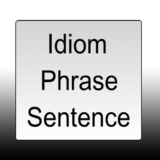Home »
Posts tagged "Idiom" (Page 3)
The Jingo Spirit One would imagine that men have always given expression to oaths—some by heaven, others by earth and the things on the earth. Many kings and queens of history have been guilty of these stupid practices. Louis XII of France is said to have uttered as his favourite oath: “The devil take me I” Oaths commonly ascribed to certain of our English rulers are : “God’s wounds !” ;...
Continue reading »
June 14, 2020 evirtualguru_ajaygourEnglish (Sr. Secondary), LanguagesNo Comment
The Writing on The Wall “In the same hour came forth fingers of a man’s hand, and wrote over against the candlestick, upon the plaster of the wall of the king’s palace.” – Daniel v.s. “The writing on the wall” is a warning of impending disaster. The great feast which Belshazzar, the last King of Babylon, gave to a thousand of his lords, his wives and concubines, while he drank impiously...
Continue reading »
June 14, 2020 evirtualguru_ajaygourEnglish (Sr. Secondary), LanguagesNo Comment
The Heel of Achilles “Hanover—the Achilles’ heel to invulnerable England.” —CARLYLE. To “bruise the heel of Achilles” is to attack a person, or a nation, at its weakest point. It used to be said of Ireland that she was “the Achilles’s heel of the British Empire,” doubtless on account of her internal dissensions and her alleged disloyalty. Invulnerability was ever the one desideratum of the gods and heroes of mythology. Many...
Continue reading »
June 14, 2020 evirtualguru_ajaygourEnglish (Sr. Secondary), LanguagesNo Comment
Keep the Wolf from the Door This phrase indicates mankind’s heartfelt wish that the specter of hunger and the haunting fear of the consequences of debt must be banished from the very threshold of their lives. One of the earliest poetical references is in Harding’s Chronicle (1470): Endow hym now with noble sapience, By which he may the wolf were (that is, beat or drive away) from the gate. In the...
Continue reading »
June 14, 2020 evirtualguru_ajaygourEnglish (Sr. Secondary), LanguagesNo Comment
Neither Fish, Flesh, Fowl nor Good Red Herring “She is neither fish nor flesh nor good red herring.” —JOHN HEYWOOD: Proverbs (1540). The phrase may have been amended: the words “nor good red herring” being tacked on by someone who wished facetiously to emphasize it ; just as the word “fowl” has been added in our day. Its meaning is to describe certain types of men who pride themselves on their...
Continue reading »
June 14, 2020 evirtualguru_ajaygourEnglish (Sr. Secondary), LanguagesNo Comment
The Road to Hell is Paved with Good Intentions “Hell is paved with the skulls of priests.” -ST. CHRYSOST This Greek proverb may be the origin of our phrase, for it well illustrates its meaning, namely that there are people in every age who, though they always mean well—whose motives, indeed, are always of the best—seem congenitally incapable of doing the right thing. If all the wrongdoers in all the ages...
Continue reading »
June 14, 2020 evirtualguru_ajaygourEnglish (Sr. Secondary), LanguagesNo Comment
A Gerrymandered Job The noun “job” originally meant a patched piece of work, a temporary repair. In civic affairs it has come to mean an undertaking ostensibly in the public interest but really for one’s own prom. This detestable conduct is called “job-berry,” A “gerrymandered” and a “jerrybuilder” are closely-related tunes. Both are dangerous to social well-being, for they always act selfishly, even recklessly. Since time began, there have been building-contractors...
Continue reading »
June 14, 2020 evirtualguru_ajaygourEnglish (Sr. Secondary), LanguagesNo Comment
Play Havoc “That bold and skeptical spirit which cried havoc to the prejudices and superstitions of men.” –Buckle: Hitt of Civilization. Our modern use of the word “havoc” is in the phrase “play havoc,” or “make havoc,” by which we mean that one is engaged in ruthless destruction of a thing, generally in a figurative sense, as an iconoclast will destroy all sorts of religious beliefs and political systems. The word...
Continue reading »
June 14, 2020 evirtualguru_ajaygourEnglish (Sr. Secondary), LanguagesNo Comment
Page 3 of 7« Prev
1
2
3
4
5
6
7
Next »























